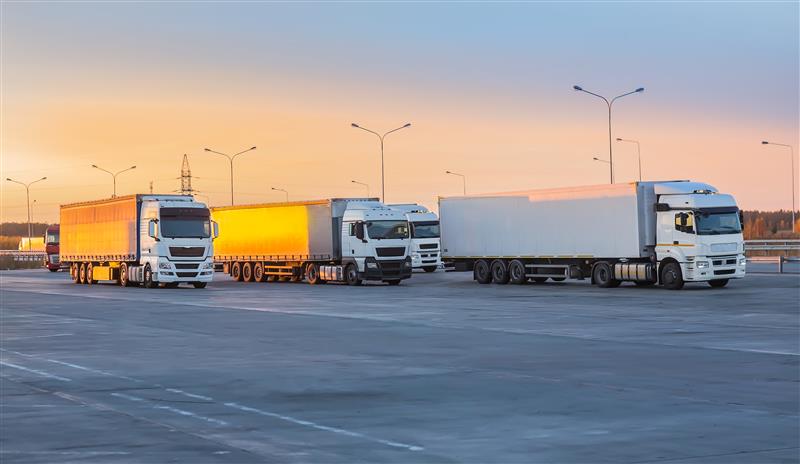
Guest
Les camions peuvent-ils circuler le dimanche en Europe ?
Créée: 23/12/2024
•
Mise à jour : 23/12/2024
Pour faire face aux interdictions de circuler le dimanche en Europe, il est nécessaire de bien comprendre les réglementations nationales, les variations saisonnières et d'adopter des stratégies efficaces. En investissant dans une planification minutieuse des itinéraires, en restant informées, en optimisant les opérations et en tirant parti de la technologie, les entreprises de flotte peuvent atténuer l'impact de ces restrictions.
Dans ce blog, nous explorons les différentes règles en vigueur dans divers pays européens et nous nous penchons sur les meilleurs moyens de s'y adapter.
Réglementations spécifiques à chaque pays
Chaque pays dispose de sa propre législation en matière d'interdiction de conduire le dimanche, et celle-ci peut varier considérablement.
Allemagne
De 12 heures à 22 heures le dernier jour de la semaine, les camions de plus de 7,5 tonnes ne sont pas autorisés à circuler. Toutefois, cette interdiction n'est pas nécessairement dissuasive. Les opérations de transport combiné peuvent bénéficier d'autorisations spéciales : le transport ferroviaire et routier est autorisé dans un rayon de 200 kilomètres autour des stations de chargement ou de déchargement, et le transport portuaire ou routier est autorisé dans un rayon de 150 kilomètres autour des ports. Le transport de certaines marchandises périssables est également exempté, comme le lait frais, les produits laitiers, la viande, le poisson, les fruits et les légumes.
En outre, certains véhicules et opérations ne sont pas soumis à l'interdiction, tels que les véhicules d'urgence utilisés pour la récupération, le remorquage ou les services de dépannage.
France
Sur ce territoire, les restrictions de circulation sont similaires à celles de l'Allemagne et s'appliquent aux camions de plus de 7,5 tonnes. Ces embargos ont lieu les dimanches et jours fériés de 12 heures à 22 heures.
À cela s'ajoutent des restrictions le samedi et la veille des jours fériés, avec une interdiction de conduire de 22 heures à 12 heures. Pendant l'été, certains samedis sont interdits de circulation de 7 heures à 19 heures.
Des exemptions existent pour certaines marchandises, notamment les produits laitiers et la viande, ainsi que pour les véhicules d'urgence. Les violations de ces interdictions peuvent donner lieu à des amendes importantes allant de 750 € à 3 750 € pour les particuliers et les entreprises, respectivement.
Italie
En Italie, les dimanches et jours fériés, les camions ne sont pas autorisés à circuler sur les routes de 9 heures à 22 heures. Il convient de noter qu'en juin, juillet, août et septembre, l'embargo commence plus tôt, à 7 heures du matin, mais se termine toujours à 22 heures.
Le pays impose également des restrictions supplémentaires pendant les mois d'été. En juillet, il y a un embargo le samedi de 8 heures à 16 heures, et cet embargo s'étend de 8 heures à 22 heures en août.
Bien qu'il s'agisse des règles générales, il est essentiel de savoir qu'il peut y avoir des variations locales ou des restrictions temporaires sur certains itinéraires. Comme en France et en Allemagne, certaines exceptions peuvent également s'appliquer à des types spécifiques de marchandises ou de services d'urgence.
Espagne
En ce qui concerne l'Espagne, le scénario est beaucoup plus complexe. Il existe une mosaïque d'interdictions régionales, en particulier en Catalogne. Les restrictions de conduite pour les camions peuvent changer en fonction des réglementations locales, des jours fériés et des itinéraires spécifiques. Les camionneurs opérant dans ce pays doivent consulter les directives locales pour s'assurer de leur conformité.
En plus des injonctions pour les dimanches et les jours fériés, il existe également des limitations pour certains samedis pendant les mois d'été. Celles-ci s'appliquent généralement de 8 heures à 12 heures, en particulier en juillet et en août, lorsque le trafic est plus important en raison de la présence de vacanciers.
Autres pays
En ce qui concerne les autres pays européens, beaucoup d'entre eux appliquent également leur propre interdiction de circuler le dimanche. L'Autriche, par exemple, interdit aux camions de plus de 7,5 tonnes de circuler le dimanche de 12 heures à 22 heures. La Suisse applique une mesure similaire, les véhicules de plus de 3,5 tonnes n'ayant pas le droit de circuler pendant toute la journée.

Stratégies pour les entreprises de transport routier
La planification efficace des itinéraires est cruciale pour contourner les restrictions de circulation des camions du dimanche. En utilisant des technologies avancées et une réflexion stratégique, les opérateurs de flotte peuvent optimiser leurs processus.
Utiliser un GPS et un logiciel de planification d'itinéraires
L'utilisation de systèmes GPS modernes et de [logiciels de planification d'itinéraires] (https://snapacc.com/newsroom/route-optimisation-with-fleet-management-software-snap-account/) permet aux flottes et à leurs chauffeurs d'identifier les trajets les plus efficaces tout en évitant les zones interdites à la circulation. Ces outils peuvent fournir des mises à jour en temps réel sur l'état des routes, ce qui permet aux camionneurs de prendre des décisions éclairées en cours de route.
Envisager des itinéraires alternatifs
Une autre idée consiste à explorer différents moyens de se rendre à l'endroit en question. Bien qu'il puisse être tentant de s'en tenir au chemin le plus direct, les itinéraires alternatifs permettent souvent de gagner du temps et d'éviter des amendes potentielles. Ces détours peuvent être légèrement plus longs, mais ils permettent de contourner des zones soumises à des embargos stricts, ce qui facilite les opérations.
Prévoir les retards
Compte tenu de la possibilité de retards dus aux embouteillages ou aux embargos sur la conduite, il est également judicieux que les entreprises de flotte prévoient des délais supplémentaires dans leurs programmes. Une approche proactive permet de mieux respecter les délais de livraison, même en cas de problèmes inattendus.
Se tenir informé
Se tenir au courant des réglementations et des conditions de circulation en temps réel est tout aussi crucial. C'est pourquoi il est judicieux d'utiliser des applications et des sites web spécifiques - ceux-ci fournissent aux camionneurs des mises à jour en direct sur les fermetures de routes, les accidents et les embouteillages, ce qui leur permet d'ajuster les itinéraires et d'éviter tout retard.
De nombreuses associations de transport et de nombreux prestataires de services logistiques proposent des services d'abonnement aux alertes routières. En s'inscrivant à ces notifications, les opérateurs de flotte peuvent recevoir des informations sur tout changement des règles de conduite et s'assurer qu'ils les respectent.
Tirer parti de la technologie
L'utilisation de la technologie peut améliorer l'efficacité opérationnelle et le respect des [réglementations sur les temps de conduite] (https://snapacc.com/newsroom/drivers-working-time-directive-a-guide-for-truck-drivers/).
Les systèmes télématiques permettent aux entreprises d'assurer le suivi de la localisation des véhicules, de la consommation de carburant et du comportement des conducteurs. Ces données peuvent s'avérer précieuses pour optimiser les itinéraires. De plus, la tenue de carnets de bord numériques simplifie l'archivage et fournit une documentation essentielle en cas d'audit.
La technologie permettant de simplifier les paiements est tout aussi importante, et c'est là que SNAP peut apporter son aide.
S'inscrire à SNAP
Que vous soyez à la recherche d'un parking sécurisé, d'une station de lavage pour camions ou d'autres services pour vos flottes, nos solutions rendent le paiement de ces services beaucoup plus pratique. Jetez un coup d'œil à ce que SNAP peut vous offrir aujourd'hui.


